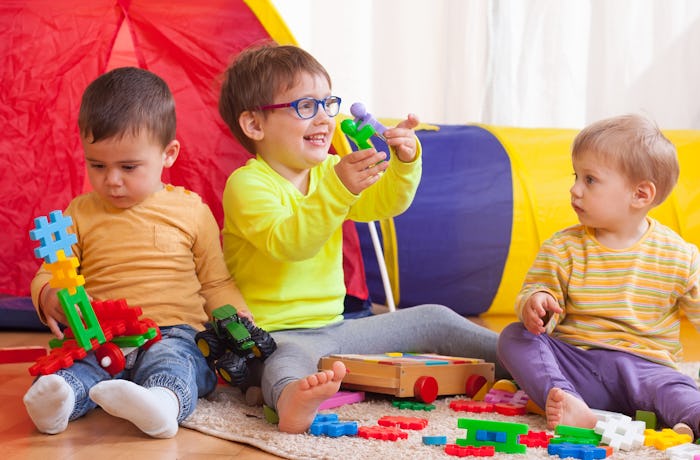Life

How To Ask Safety Questions Before A Playdate Without Sounding Totally Paranoid
From the moment your children arrive on this planet, parental worry begins. According to my mom who has raised four children — and every other seasoned parent I know — that worry never ends. “Even when your kids are 33,” she says, reminding me that I am still her baby. But even though you take every precaution, there comes a day when your kid’s care is out of your hands, including when they visit friends’ houses. So knowing how to ask safety questions before a playdate (without sounding totally paranoid) can ease some of your concerns.
“Most parents are comfortable asking places tough questions to keep their children safe, however, asking friends, family, and others we know the same questions isn’t always so easy,” Stacy Pendarvis, program director at the Monique Burr Foundation for Children, tells Romper in an email interview. “While people often assume abuse happens by strangers, or people unfamiliar to the child, research shows that most sexual abuse and victimization happens by someone a child knows and trusts like a relative, a babysitter, a neighbor, a friend’s older sibling, or even a parent. Therefore, it’s important to ensure your child is safe with anyone who watches them.”
When it comes to asking about red flags, Pendarvis says it starts with simply being honest. “Tell them you know child safety is important to them as well, but you want to make sure you’re both informed and on the same page about safety and the rules for your child,” she says.
If it helps, then Pendarvis says try introducing a bit of humor by saying something like, “I know people think I’m overprotective and neurotic, but I need to ask a couple of questions.” Once you break the ice, make sure to ask if they will be present and supervising your child the entire time he or she is with them. Take time to also ensure that older siblings, family members, neighbors, or other children “will not be alone with your child without their direct supervision,” she says, adding that 30 percent of sexual abuse occurs by an older or more powerful child and often with adults in nearby rooms.
It is also important to ask about weapons, access to pools, alcohol, and so forth, making sure that they are secured or locked away. Pendarvis says you should also talk to parents about monitoring your child’s access to digital devices as well, including the number of hours of screen time they’re allowed and what websites and apps that they may or may not visit or use.
Of course, Pendarvis adds that while “these conversations will go a long way toward keeping your child safe,” it’s also important to make sure your child understands safety measures and how to identify red flags. “Explain that while it’s OK for them to be around other people, swim, visit a neighborhood playground, or play online games, the adult you are leaving them with should always be present to supervise,” she says.
Make sure to also remind them that the rules you establish apply at all times, whether they are at home or not, and ensure that they know how to contact you when they are away from home. Pendarvis also recommends establishing a private code word for them to call or text if they feel unsafe and need to be picked up. When they arrive home, ask specific questions about their time away, including who was there, what they did, and whether or not they felt like were in any unsafe situations.
“With some precautions and important conversations with your child, and the adults they are with, your child will be able to spend time with others and stay safe,” Pendarvis says.
Like I said, the worry never ends. But with the right conversations, you can certainly find a bit of comfort.